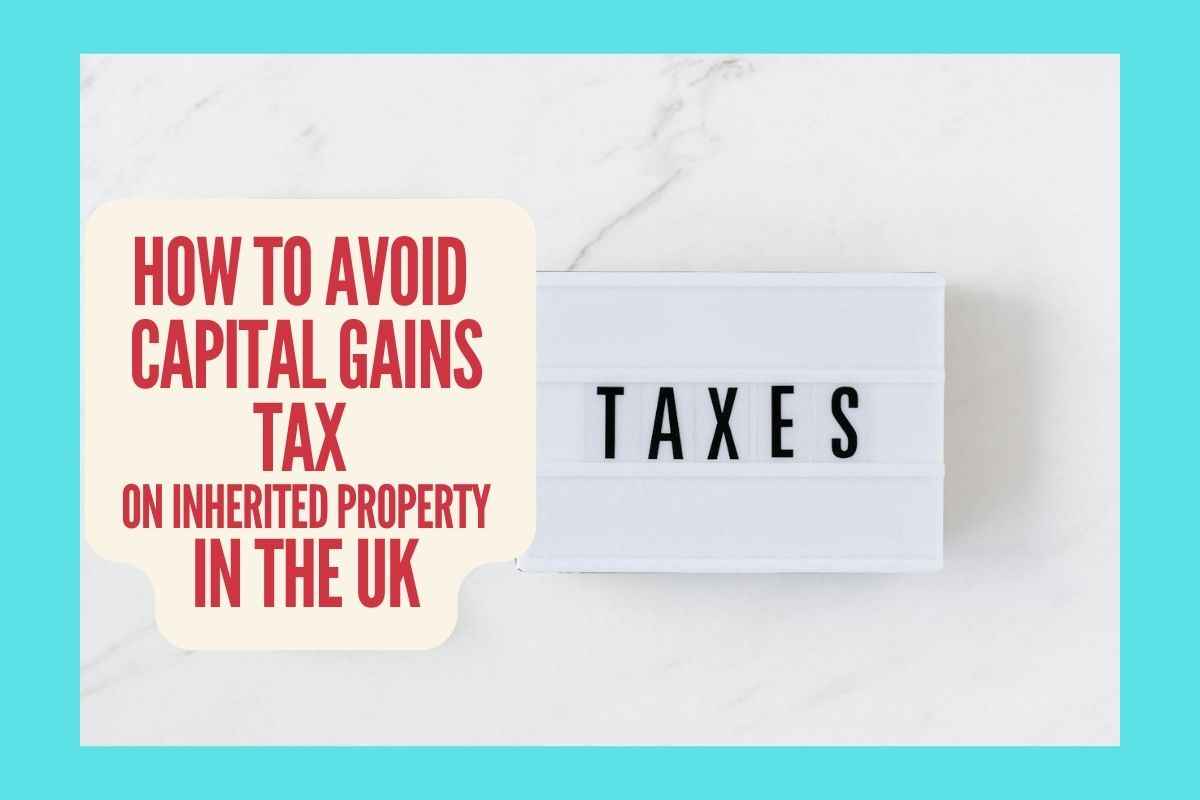Got a property of inheritance as an heir from your deceased elder?
Want to sell the inherited property at a profit but are worried about the capital gains tax that will get applied to the profit?
Then this article on “how to avoid capital gains tax on inherited property UK” is for you. We understand how important educating Yourself about capital gains tax on property is.
So, we have covered every detail of this topic in our write-up. Keep reading to stay informed about the rules and regulations of capital gains tax on inherited property in the UK.
Also, learn from us how to bypass this burden of paying CGT for your profit.
Capital Gains Tax (CGT) On Property – A Brief Overview:

Capital gains tax on various properties is a tax levied by the UK government on the citizens who acquire revenue after selling or renting their property.
The tax gets applied on the profit (from selling/renting) that comes because of the increase in the selling value of a property from its previous value.
The previous value of the property is considered as the price of the property which was estimated at the time of its ownership by the present owner.
The properties that come under the UK capital gains tax include different assets like-
- Property.
- Shares & stocks.
- Personal properties (for example, house, car, jewellery, etc).
Capital gains tax on property is applicable for the profit on any of the assets above. However, here we will solely focus on the CGT on inherited properties.
Capital Gains Tax On Inherited Properties- The Rules:
Inherited properties are the properties that get transferred to the heir of a deceased person after his/her death.
No Capital Gains tax gets applied to such property if the heir chooses to reside in it or use it. I’m that case, he only has to pay the inheritance tax.
However, if he plans to sell it later at a price more than the price of the property during its transfer on inheritance background, he earns a profit.
So, at that time, he has to pay the capital inheritance tax on that profit. If the heir decides to sell a part of the inherited property and stays in the remaining portion, he will get an annual exemption on the CGT.
This exemption must be applied to the tax of the deceased person’s year of death and the next two years.
If after the deceased person’s death, the property is inherited by multiple heirs (who are siblings or have any other relationship), they get the right to decide what they will do.
They can stay in the property or can sell it. On selling the property, they have to pay capital gains tax on its sales
profit. However, the siblings can unitedly avoid paying CGT by utilizing all of their annual allowances. Distributing the gains among themselves helps them escape the CGT payout.
Are you a personal representative and your CGT payment amount is due? Then you will get both notifications and payment instructions regarding it from the HMRC.
How To Avoid Capital Gains Tax On Inherited Property UK – The Tricks:
Paying CGT for inherited properties that are being sold for profit is mandatory for UK citizens. However, there are some tricks you can use in legitimate ways to avoid this tax payment. They are-
1. Annual Exemption:
The UK government has given each citizen of the UK a threshold for annual capital gains tax exemption.
According to its declaration in 2023, the 2023- 2024 tax year exempts up to a tax of 6000 pounds for common citizens and 3000 pounds for trusts.
So, as a citizen of the UK, if your inherited property sales profit exceeds 6000 pounds, only then do you have to pay the tax for it.
2. Spouse Exemption:
Have good bonding with your spouse? Do you trust him/her more than yourself? Then sell or transfer the inherited property to him with a mutual contract.
As soon as you do it, you will get relieved from the capital gains tax on property. So, you can freely use extra CGT annual exemptions in this case.
3. Principal Private Residence Relief:
Staying in the house or property that your deceased elder gave you? Congrats you will stay away from the headache of paying capital gains tax on property.
Even if capital gains tax somehow gets imposed on you because of the part selling of your inherited property, it will be of meager amount.
So, make the inherited property your main residence to eliminate/reduce the capital gains tax on property.
The concession of the CGT amount is given for the time proportion of the ownership of the property by the deceased person.
Or, it is given for the period of the beneficiary’s inhabitation in it (making it the main residence), whichever the beneficiary chooses.
4. Charity Exemption:
Any asset or property if sold for charity exempts you from capital gains tax on property. However, in that case, you have to sell the property at the same value which applies to the property on the day of its inheritance.
Or, you have to make a contract with the charity accepting company and then officially showcase the profit as being donated to charity.
By doing that, you will never have to pay the CGT rate for the estate even after you gain profit by selling it.
5. Utilizing allowances:
Make HMRC aware that you have faced a loss on your chargeable asset. By doing that, you will have to pay less tax in the same year.
This is because it will showcase your total taxable gains to the tax accumulating office as zero for that very year. It will be done by adjusting the loss with your gain amount.
If you find that the profit is still more than the loss, you can bring into play the unused losses that you had in the previous tax years.
However, if the loss amount is more than the profit amount, secure the remaining loss amount for claiming tax redemption on the next tax year.
6. Transferring The Property To A Dependent Relative:
Still wondering, how to avoid capital gains tax on inherited property in, the UK? Transfer your property to the name of your dependent relative who has agreed to live in the property.
Put conditions before him and after you both agree to the contract, proceed on for the transfer of property to that dependent relative’s name.
You will get a holdover relief. To get holdover relief, your dependent relative needs to stay in that property forever. He cannot sell the property in the future if the tax has to be evaded.
FAQS:
1. What is the capital gains tax rate for 2024 UK?
Ans. The CGT on the property for UK inhabitants in 2024 charges 10 per cent of the profit. It’s applicable for people whose total taxable gains plus income remains less than 37,700 pounds.
2. How long do you have to keep a property to avoid capital gains tax UK?
Ans. Want to avert capital gains tax on property? Start residing in the property. Do it for at least the last nine months before selling it. Also, you are required to own the property. Live for at least 10 years before you sell it to not pay capital gains tax on it.
3. How do I avoid capital gains tax on a deceased estate UK?
Ans. To avoid the capital gains tax on such a property, you need to sell the property within a few months before its value increases. If you sell the property at the value, that was when you received it, no capital gains tax will be applied on your property sale.
Also, if you gift or transfer the property to your spouse, the CGT will be exempted. Moreover, giving the property to charity is also another way to escape CGT. You can also avoid paying CGT by planning wisely with your allowances or inhabiting in the house by making it a primary house.
4. How to avoid capital gains tax on second homes UK in 2024?
Ans. One can avoid spending on CGT for his second home by splitting the property ownership between him and his spouse. He can also do the same along with a civil partner. This trick helps double your CGT allowance. The couples as partners can combine their allowances to enjoy freedom from CGT tax of up to 12,000 pounds (for the years 2023 – 2024).
Conclusion:
So, only a strategic cum informed approach can save you from paying the capital gains tax on property in the United Kingdom. Understand the nuances of capital gains tax. Establish accurate base rates and learn to use the privilege of available reliefs. Go through the above tricky strategies for avoiding your capital gains tax and choose the one that best suits you.
Are you still unable to understand the complications of capital gains inheritance tax and all? Choose to call a professional for your help. Remember, proactive planning will always help you to save more by nullifying the capital gains taxes. Both the heir and the successive generation of people will get this advantage if claim with a solid plan.






